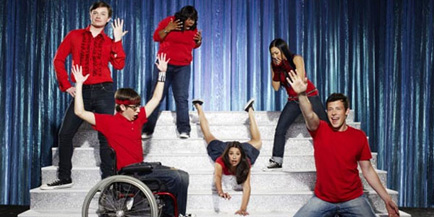|
|
Mythology: GleeBy Martin FelipeMay 19, 2010
There’s nothing that will ever make the fantasy of a bunch of characters breaking out into song, everyone somehow knowing all of the dance moves, a reality. At first, Glee was taking the Chicago the movie approach of making the numbers all glee club performances. As the show has evolved, it has embraced its musical roots more and more and will often present numbers for their own sake, eschewing any sense of reality. This potentially alienating technique shows a confidence on the part of the writers, and I welcome it. A song in a musical expresses the emotional state of the characters and the means of expression doesn’t have to make sense, it just has to be entertaining, and entertaining is something Glee delivers in spades. The other issue, the shallowness of musicals, remains a problem. I like candy. Who doesn’t? Thing is, we need nourishment too. There is room for fluff on television to be sure. Not everything can bear the weight of a Galactica style apocalypse, a 24 style terrorist threat, or a Lost style philosophical debate. Still, as we grow, we lose our craving for candy. We crave more sustenance. If Glee is to grow with us, the themes and characters need to deepen. I don’t think Glee will ever get too existential or anything, but there do seem to be some strides towards giving the conflicts a semblance of depth, the characters a hint of complexity. Not to name drop a favorite auteur or anything, but look no further than Joss Whedon’s recent Dream On episode of Glee to see how an episode can still bring the show stopping numbers, while layering the goings on with even a hint of real drama. And it is this drama that Glee really needs. The thing is, as great as the performances are, the show is a bit like Family Guy in that one’s enjoyment of an episode is often dependent on one’s familiarity with the musical references. Since I doubt Glee will ever drop its spot-the-pop-hit nature, it needs the greater gravitas for it to last. Again, it will never be a weighty show. It’s cotton candy and there’s not necessarily anything wrong with that. It’s just that the writers need to follow Whedon’s lead and sneak the vitamins in there. Yes, I believe they need to, or Glee’s star might just burn a little too brightly for a while, before burning out, leaving a black hole behind.
|

|
|
|

|
Friday, November 1, 2024
© 2024 Box Office Prophets, a division of One Of Us, Inc.


